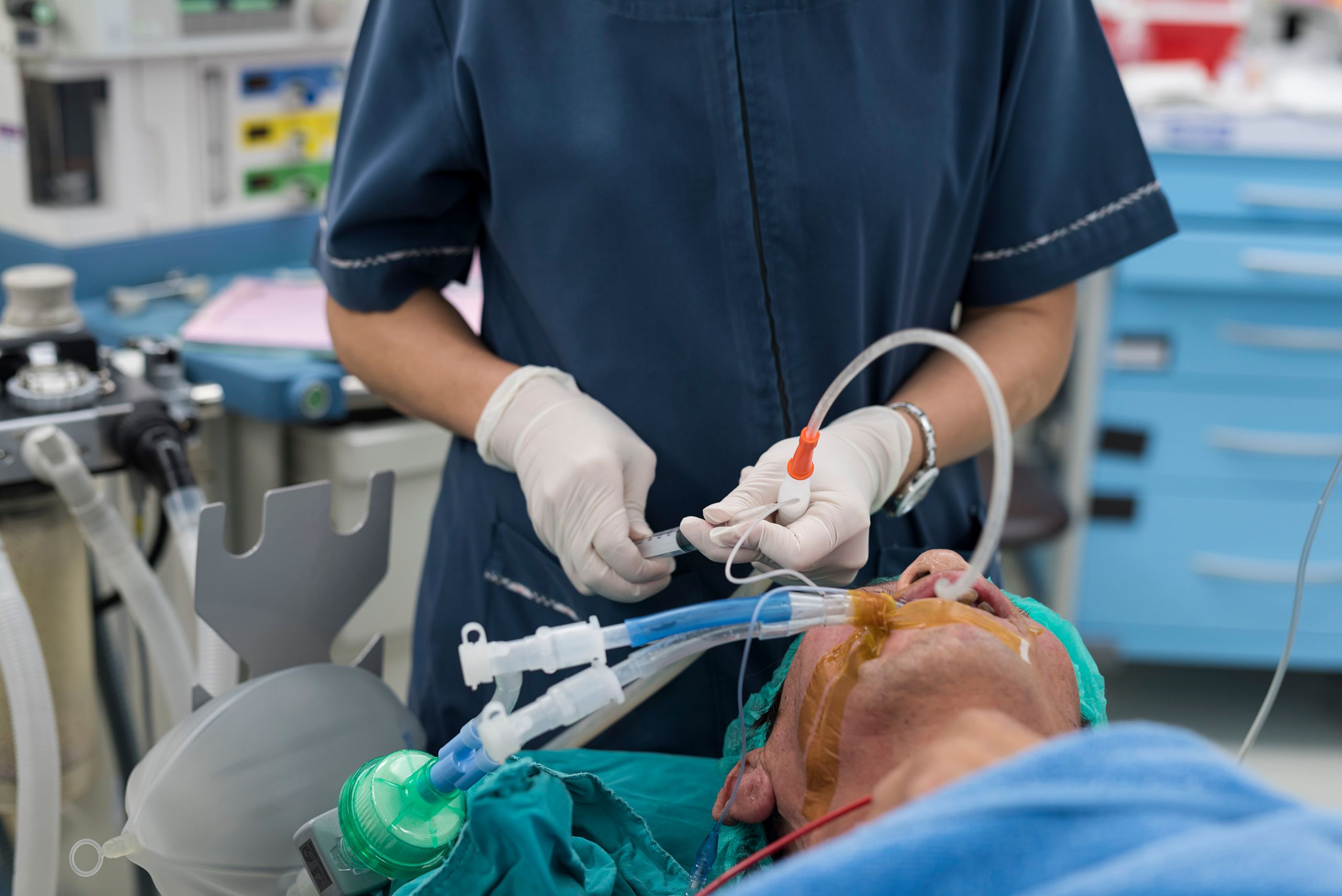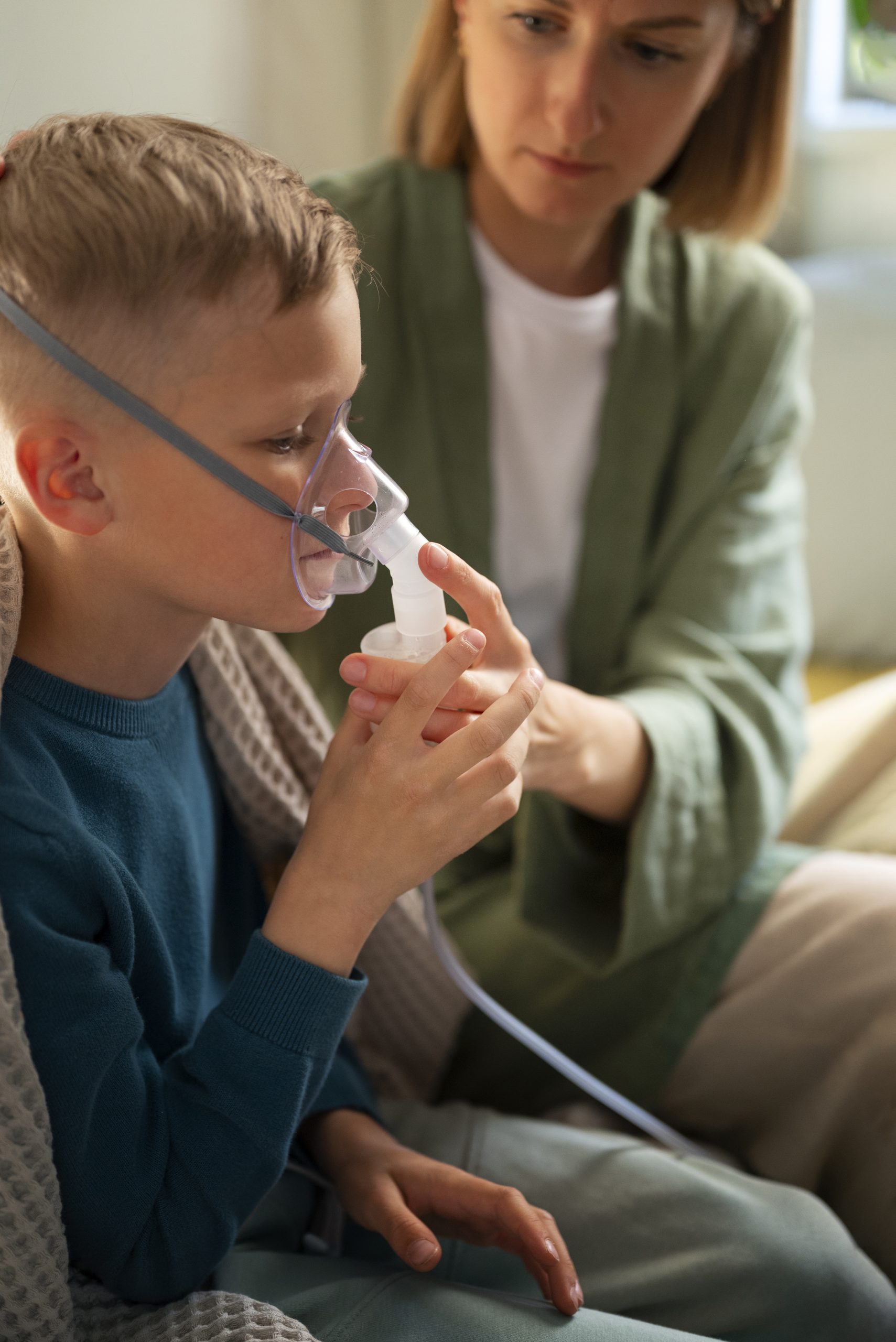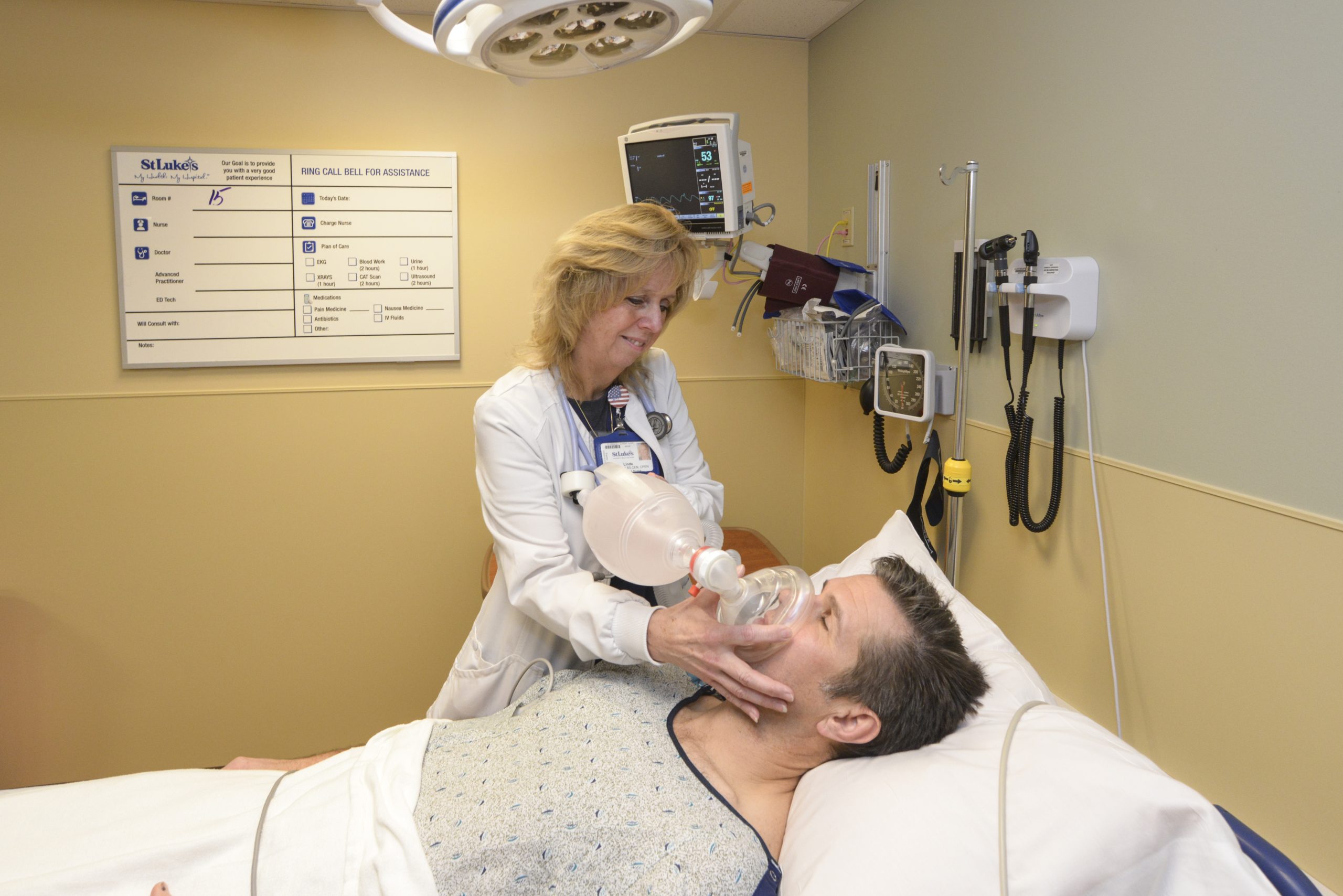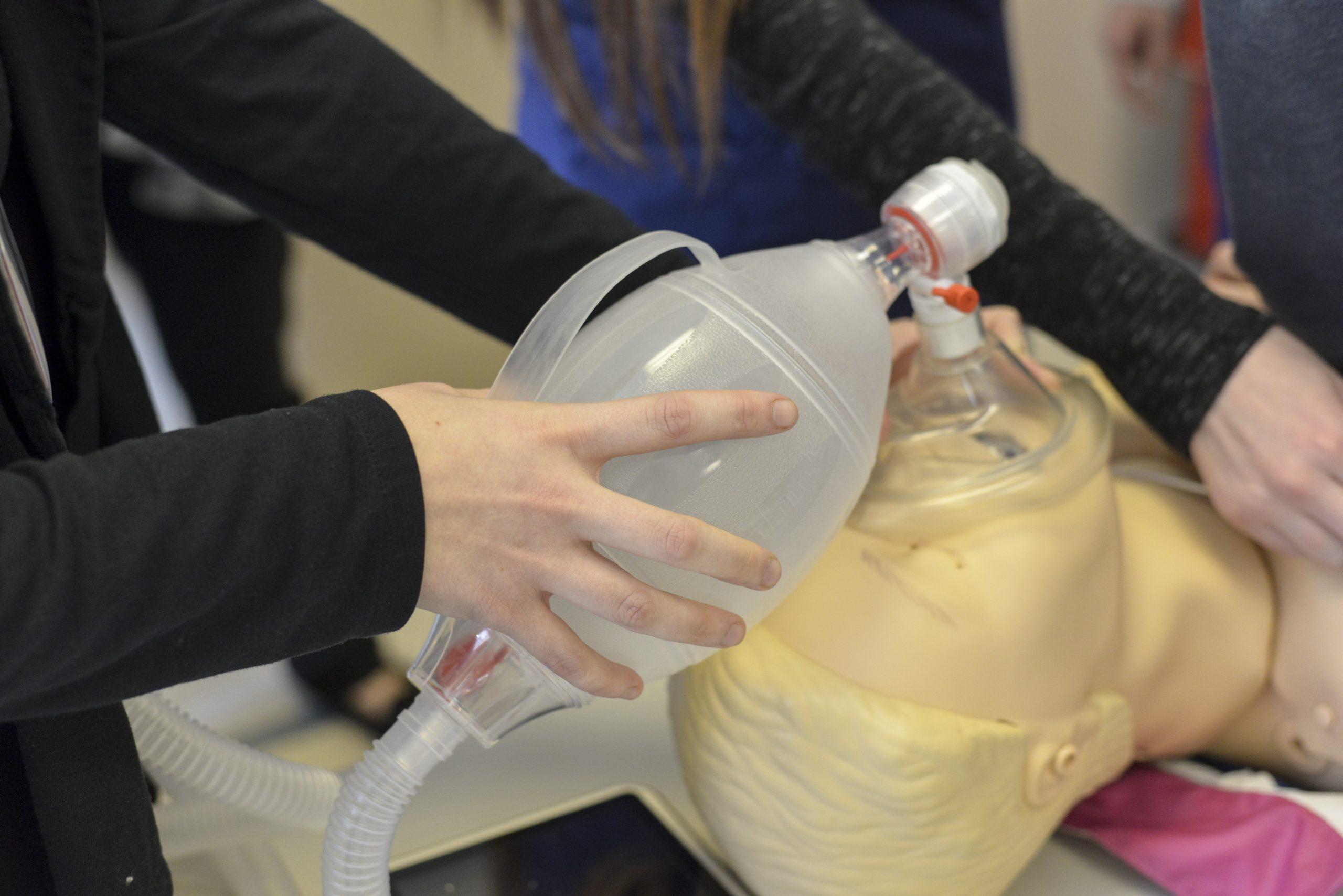Respiratory Care

Your Future in Respiratory Health Starts Here
Are you passionate about making a difference in people’s lives? Our Respiratory Care program offers you an opportunity to earn an associate degree in respiratory care and play a vital role in the health care team.
As a respiratory therapist, you will be at the forefront of treating, managing, evaluating, and caring for patients of all ages with cardiopulmonary complications. You’ll have the chance to make a significant impact, from creating long-term care plans to providing essential education, training, and information to patients and their families.
Imagine yourself addressing breathing conditions in various dynamic environments, including emergency rooms, doctors’ offices, maternity units, nursing homes, hospices, and home care settings. Your expertise will be critical in performing pulmonary function testing, administering oxygen therapy, monitoring blood oxygen levels, managing mechanical ventilation, delivering medications, and closely assessing and monitoring breathing.
Our program is designed to prepare you to enter the profession as a competent entry-level respiratory therapist, fully equipped to take and pass the National Board of Respiratory Care (NBRC) nationally recognized credentialing examinations.
St. Luke’s College of Health Sciences is currently in the process of seeking CoARC accreditation for a respiratory care program. However, St. Luke’s College of Health Sciences can provide no assurance that accreditation will be granted by the CoARC (Commission on Accreditation for Respiratory Care).

Why Choose a Career in Respiratory Care?
Choosing a career in Respiratory Care offers the opportunity to “save and improve lives.” This profession is highly rewarding and currently in great demand, with growth projections indicating an increasing need for skilled respiratory therapists.
A career in respiratory therapy can lead to numerous professional avenues, including roles such as clinician, adult critical care specialist, pulmonary function technologist, sleep technologist, asthma educator, neonatal/pediatric specialist, tobacco cessation counselor, pulmonary rehabilitation specialist, respiratory care sales representative, and home care provider, among others.
If you still need more reason to consider respiratory therapy as a career, here are some impressive statistics from the U.S. Bureau of Labor Statistics (data modified April 18, 2025).
13%
Projected Employment Growth from 2023-33
8,200
Projected Annual Job Openings in U.S.
Top 10
Healthcare Career in Demand by Growth Rate and Salary
The rapid growth and demand in respiratory therapy is attributed to the aging baby-boom population, which will lead to an increase in respiratory conditions such as chronic obstructive pulmonary disease (COPD) and other related disorders. Additionally, advances in medical technology will continue to improve the ability to manage and treat patients, further increasing the demand for skilled respiratory therapists.
Learn more about being a respiratory therapist by watching Being a Respiratory Therapist or The World Needs More Respiratory Therapists, videos created by The American Association for Respiratory Care’s, the National Board for Respiratory, and the Commission on Accreditation for Respiratory Care.

Learn More about our Respiratory Care Program
To educate students as caring, knowledgeable, and socially responsive respiratory care professionals who use critical thinking as they provide excellence in the assessment, treatment, and monitoring of cardiopulmonary patients, including adults, children, and neonates.
- Small class sizes
- Association with a major health network that’s repeatedly been recognized as a top teaching hospital
- Diverse learning environments and clinical rotations
- Career placement and job opportunities right at your training site
- To prepare graduates with demonstrated competence in the cognitive (knowledge), psychomotor (skills), and affective (behavior) learning domains of respiratory care practice as performed by registered respiratory therapists (RRTs).
- Serve as an effective registered respiratory therapist who advocates for vulnerable populations.
- Demonstrates competent respiratory therapy care by applying critical thinking and problem-solving principles.
- Exemplify safe, professional, inclusive patient-centered care by effective communication and teamwork while in the health care setting.
- Carry out principles of morality and ethics while functioning within the scope of practice for respiratory therapists.
- Integrate healthcare technology and informatics to enhance interprofessional collaboration and improve respiratory wellness across the lifespan.
Program-specific tuition covers the costs of running clinical programs with limited enrollment, based on factors like student-to-faculty ratios mandated by accreditors and limited clinical seats. It also covers the costs of program-specific resources, such as simulation supplies, equipment maintenance, specialized software, etc. Program-specific tuition is charged once a semester.
| Program | Program-specific Tuition (per semester) |
| Respiratory Care | $1,800 per semester |
Please Note: Program-specific tuition is in addition to per-credit tuition. Learn more about our College Tuition & Fees and our Admission requirements.
St. Luke’s College of Health Sciences is currently in the process of seeking CoARC accreditation for a respiratory care program. However, St. Luke’s College of Health Sciences can provide no assurance that accreditation will be granted by the CoARC (Commission on Accreditation for Respiratory Care).
Courses and Credits
Respiratory Care Program Curriculum
Total Credits: 68
| Code | Number | Semester | Course Name | Credit Hours |
| BIO | 100 | Fall | Anatomy & Physiology I | 4 |
| MAT | 100 | College Algebra | 3 | |
| HSC | 100 | Medical Terminology | 1 | |
| COM | 100 | Communication, Professionalism and College Success | 1 | |
| RCP | 100 | Intro to Resp Care | 2 | |
| RCP | 101 | Cardiopulmonary Pharmacology | 3 | |
| Semester Credits | 14 | |||
| BIO | 110 | Spring | Anatomy & Physiology II | 4 |
| PSY | 100 | General Psychology | 3 | |
| RCP | 111 | Mechanical Vent I (3 hrs.) | 3 | |
| RCP | 121 | Mechanical Vent LAB (2 hrs.) | 1 | |
| RCP | 110 | Resp Care Equipment (2 hrs.) | 2 | |
| RCP | 120 | Resp Care Equipment LAB (2 hrs. lab) | 1 | |
| Semester Credits | 14 | |||
| RCP | 200 | Summer (12 weeks) | Cardiopulmonary Pathophysiology (one 4 hr.) | 3 |
| RCP | 201 | Clinical I (two 8 hour days x 12 weeks = 192 hrs.) | 3 | |
| Semester Credits | 6 | |||
| RCP | 210 | Fall | Respiratory Research | 3 |
| RCP | 211 | Cardiology / Hemodynamics | 3 | |
| RCP | 212 | Mechanical Vent II | 4 | |
| ENG | 100 | English Composition | 3 | |
| RCP | 213 | Clinical II (two 8 hr. shift = 240 hrs.) | 4 | |
| Semester Credits | 17 | |||
| CHM | 100 | Spring | General Microbiology | 4 |
| RCP | 220 | Neonatal Pediatrics / Pulmonary Diagnostics | 4 | |
| RCP | 221 | Clinical III (ICU and Elective Rotation(s) (three 8 hr. shifts = 360 hrs.) | 6 | |
| Semester Credits | 14 | |||
| RCP | 230 | Summer I (6 weeks) | RRT Prep / Capstone Course (two 3 hr. classes) | 3 |
| Semester Credits | 3 | |||
| RCP Credits 47. Gen Ed Credits 22. Total Credits |
68 | |||
| RCP Credits | 45 | |||
| Gen Ed Credits | 23 |

Join the Frontline of Respiratory Care
Take your first step toward becoming a medical professional with both classroom and hands-on clinical learning.
